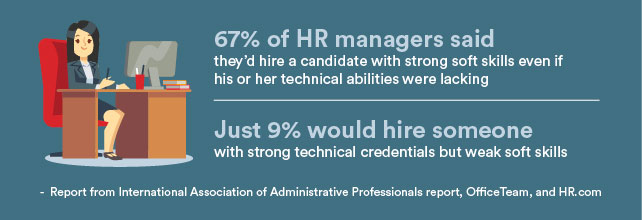In today’s lexicon, the term “soft skills” is used interchangeably with other monikers such as social skills, emotional intelligence, or communication skills. Soft skills are any personal attributes or character traits that enable a person to interact effectively with other people. Generally they are used in reference to job performance or career prospects, because soft skills are transferrable to any profession. Soft skills are evidenced in your approach to, reaction to, or outlook on the world, your everyday life and work life. They are skills that are crucial at all levels of your career, not just as a leader.
Soft skills are a complement to hard skills. Hard skills are the technical expertise and knowledge you need to do a job, like knowing how to use a specific software program, operate a forklift, or manage a budget.
Sometimes it seems the relationship between soft skills and job performance is up for debate. Why? Soft skills, by nature, are intangible. That makes them more difficult to identify, distinguish, measure, define, and therefore – utilize. It might be apparent that an employee is good with people, but it is hard to put a finger on exactly why he or she is so effective. If an employee doesn’t have soft skills, how can you best train them and build those skills? How can employers or managers objectively assess an employee’s strengths or weaknesses? How can they evaluate an employee’s proficiency in a skill? If employees are identified as being competent in a certain soft skill, is there a certification that formalizes their qualifications? Maybe these are questions will be answered as the demand for soft skills continues to intensify.
Soft Skills

Accept & use feedback
Active listening
Adaptability
Ambitious
Articulate
Authenticity
Being a good coach
Business etiquette
Collaboration
Communication skills
Confident
Conflict resolution
Conscientiousness
Cooperative
Creative thinking
Critical thinking
Curiosity
Customer service
Deal with change & uncertainty
Decision-making
Dedicated
Delegation
Dependable
Desire/ability to learn
Empathy
Flexibility
Focused
Friendly/enthusiastic
Giving clear feedback
Gracious
Honest
Innovative
Inspiring
Integrity
Intercultural competence
Loyal
Mentoring
Motivation
Multitasking
Networking
Obtain & process information
Optimism
Organized
Patient
Perseverant
Persuasion/ability to influence others
Planning
Positivity
Prioritize work
Problem-solving
Professionalism
Public speaking
Respectful
Self-motivated
Sense of humor
Supporting colleagues
Story telling
Team work
Time management
Tenacity
Trouble shooting
Work ethic
Work well under pressure
Why are soft skills important?
So many people work remotely or from home, it seems like personal contact with coworkers is limited. And with the increasing use of technology, it might seem like the need for soft skills is waning. But those are exactly the reasons soft skills are so important today. There is more distraction and disruption in the workplace, and the speed of change is faster than ever before. To be successful, you need employees that are able tobe adaptable andresilient in such dynamic and uncertain situations.
Soft skills drive business success
Employers and managers would be wise to invest in soft skills training for employees. A study out of MIT showed that soft skills training offered considerable return on investment, like increased productivity and the ability to perform complex tasks more quickly. But even more interesting was the fact that there were “spillover productivity effects.” Meaning that even employees who did not participate in the training program, but worked directly with the employees who did, also showed improvements in workplace productivity. Nothing that happens in an office happens in a vacuum, which means positive (as well as negative) attitudes can spread and affect others.
Soft skills aren’t important just for the success of current employees, but they can help candidates get the job in the first place. Soft skills can help hire the right employees. Referencing the long list of soft skills above, as a hiring manager, you aren’t going to be able to find a job candidate with all of these attributes. You have to determine which skills or traits are most important for the job you are looking to fill. Soliciting feedback from current employees or managers can help you determine what is most important. Creating or using assessments or interview strategies to adequately evaluate a candidate’s soft skills is helpful.



